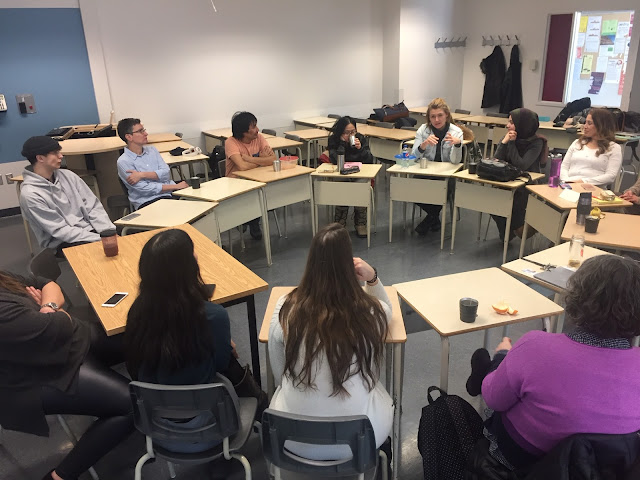HOW TO BE AN EFFECTIVE STUDENT—DESPITE… WHATEVER.
What’s the secret? I don’t know if there is
one. I do have 5 strategies that worked for me, and I’d like to share these
with you. My strategies may not work for everyone, but they’re pretty general
and adaptable. It’s worth a shot!
1. Use Word and its corrector functions
As an UQAM student, you are allowed
to download Word software for free on
your computer for the duration of your studies. For your English studies, just
set the computer to the English language in Révisions
and there you go! You’ll have squiggly red lines appearing under spelling
errors and blue squiggly lines appearing under syntactic errors. To fix them, simply
right click on them to see your options. There’s no excuse for typos anymore!
2. Get (and stay) organized!
The secret to any good work is to plan
it out first. For example, I have no fewer than a million ideas going through my
head at any one time, so I forget things; I get distracted. My secret: I write a
to-do list. I can make one, or ten—it
doesn’t matter. I just do what is on my list. It’s so satisfying to check
something off the list after I’ve done it. I make them colorful, put them in
sight, add exclamation points and lots of symbols. Moreover, when I am doing
the task, I put on some music and I alternate tasks to keep my brain interested
and focused!
Decide how it works for you. Maybe assign
yourself a quiet and pleasant space. Set up a likable ambiance and make it
work. Establish a method to your work: 5-hours at the library with people
around? 45-minutes in your room, watching 2 streaming video episodes and reading
for 30 minutes? Whatever. Just stick to it. You can allow yourself to
procrastinate (a bit). It’s all about balance! Just promise yourself to add some
stability/routine to your assignments. It’s university—and life too!
3. Pay attention to the quality of your work.
Giving depth to your work is not about
using big, fancy words. It’s all about how well your ideas are constructed and
shared. There are reasons why we establish standards to present in oral and
written form—we want people to understand us! Make the effort it takes to
obtain the information that you need. Check online, search the World Wide Web,
Google things like, “academic assignment outline”, “business report model”, “oral
presentation”, “how to write a paragraph”, etc. or just ask your teachers for
help. It’s not about being overly formal; it’s about being able to respect
standards.
4. Oral presentation – Relax, know your stuff, write it down and rehearse!
There is only one way to nail your
oral presentations. First, try to chill out! It’s not judgement day. Try not to
worry about how other classmates see you. (They are often thinking about their own presentations.) Second, know your
topic. For that, you’ll need to do some research. Read and write down everything
you can about your topic. If you forget, you can always improvise on what you
remember. Organize your ideas, (wink, wink)! Write what you want to say. (I
remember stuff more easily when I write it down.) Try writing an order to present
the elements of your talk. You should rehearse—don’t forget to rehearse! NB:
Bring notes with key words to your presentation! Reading directly off of
a full text is not going to impress anyone. (And don’t forget to rehearse!)
5. Check your emails regularly
I don’t know about other
universities, but at UQAM, it is written (somewhere) that it’s an obligation
for students to consult their emails regularly. We are in the internet
communications era. Most instructors will communicate via your student email.
Furthermore, messages sent to you on Moodle will be redirected to your email. (The
C.L.I.C communicates this way!) So, check your emails at least once a day. You
should also think of linking your student email to your personal email, it’s pretty
easy to do.
Boom!
These are 5 easy strategies that you should definitely consider for your
studies. You are here to learn, and it helps to learn HOW to learn. Don’t be
afraid to ask questions. We’re all smart in our own way. We just learn
differently. You are here and you can do this!
Yves
Gauthier
English
certificate and Bachelor of Arts student
The
C.L.I.C. project






Hi Yves !
ReplyDeleteGreat article, thank you.
I would also say: ANTICIPATION !!!!!! :) Always taking some advance in everything we do. Anticipate problems, obstacles. So that when they come, we are prepared to face them in some way.
You are absolutely right! Because we know we should expect something to not go exactly as planned. Thanks Rindra!
DeleteThank you Yves for sharing with us those interesting strategies 😊👍👍😊
ReplyDelete